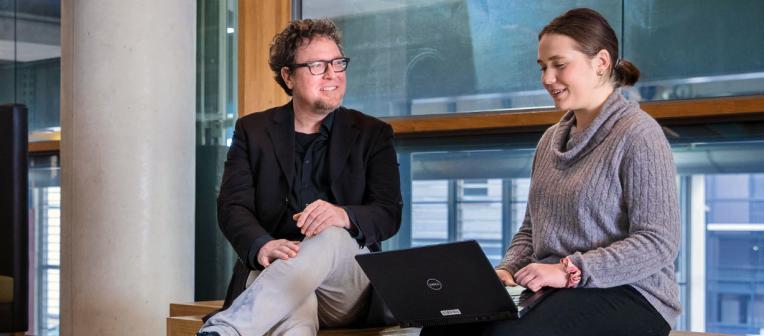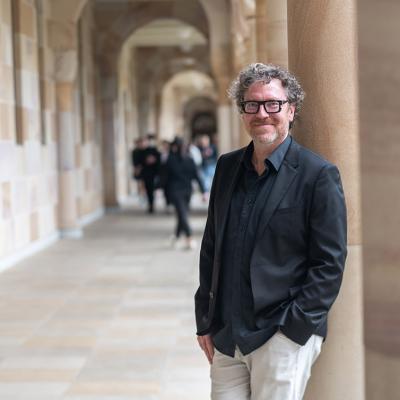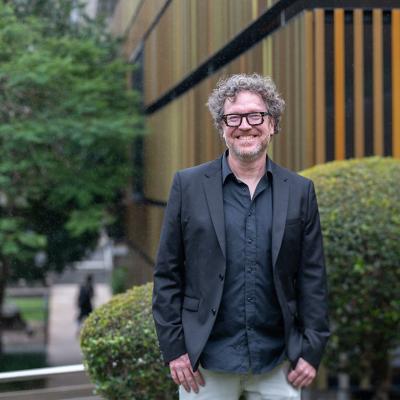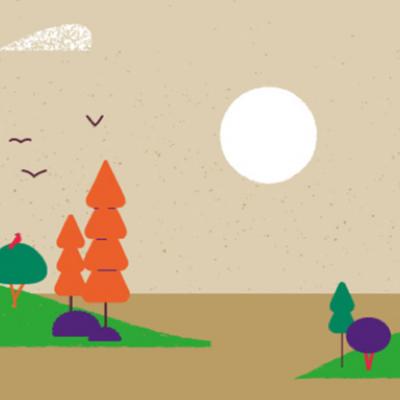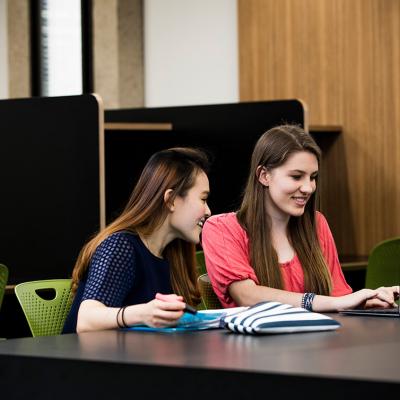Considering studying a Bachelor of Arts at university? You may have lots of questions. We're here to help you find answers.
- What’s it really like to study a Bachelor of Arts at UQ?
- What does a day in the life of an arts student look like?
- What kind of job can I get with an arts degree?
We've interviewed a UQ student and academic to find out. Giaan is a Bachelor of Arts student, and Dr Sebastian Kaempf is a Senior Lecturer in Peace and Conflict Studies. They’ve teamed up to answer some of your questions and uncover how UQ can give you the skills you need to face the future, even when you don't know exactly what the future will look like.
Let's find out if arts sounds like the study area for you.
What's been the most unexpected thing you have been happy to discover at UQ?
Giaan: Probably the interaction between lecturers and students – it's been so helpful. You think that you don't know the relationship there, the dynamic, but I mean you're really just there to help us.
What are some of the coolest jobs your former students are doing?
Sebastian: So in our field, international politics, peace and conflict studies, you have people ending up in government positions, advisors to members of parliament in Australia or worldwide. People end up in journalism, in diplomacy, as aid workers, as development practitioners, as people who mediate conflicts or resolve conflicts, peacekeepers who take care of refugees, who work in human rights, women’s rights, gender issues. This degree allows you to jump into any of these kinds of positions relevant to international politics globally.
What does a day in the life of an arts, humanities, and social sciences student look like?
Giaan: I wake up really early and get some coffee before attending a lecture. I might go study in the library for a bit before the tutorial later in the afternoon. I'll also hang out in the Great Court with some friends – often there's enough time and space to play some sport, which is really great. And then we can't forget the Red Room, where we can have a drink and catch up.
What is it about UQ's approach that makes us the most employable graduates in the state?
Sebastian: At UQ we have research-led teaching. This is a research-intensive university that's passionate about teaching. Students get some of the world's top researchers who are the ones who are at the cutting-edge end of the research but then teaching in the classroom.
So I think that's one of the really big pluses that you get here and of course you get a university that is in the top 50 in the world. You have a school that’s amongst the top 30–40 in the world. So it really opens the doors in terms of the skills you get, the understanding you get, but also in terms of where you can go in the future.
How does the way you learn at UQ give you the skills you need to face an unknown future?
Giaan: Having people with first-hand experience around you, teaching you how to achieve and their strategies and skills, is so helpful because as young students, we haven't got as much experience in this world of unknowns.
Sebastian: One of the things I find interesting, because you are in my first year, first semester intro course, so you are just fresh out of high school, and you've heard of some of the topics we're dealing with. But every new topic we do every new week is kind of an introduction into a whole new world, so you're entering a kind of unknown on a weekly basis, and what I love is the enthusiasm you get with all the new students who come in, they’re just like “wow, this is amazing” and so to be able to facilitate that entry into these worlds, is pretty stunning.
Giaan: I've never looked at so many different concepts with so many different lenses before, it's just intense. So fascinating.
How do you prepare students for the future when we don't know what the future looks like?
Sebastian: We don't know what the future looks like, but we know what it is that you need to navigate that future. Knowledge is the first one – understanding the facts and what's happening to be able to grasp something that is inherently complex, sometimes emotionally difficult, unpack it to make sense of it to critically look at it. So, the skill set you get will allow you to parachute into all sorts of scenarios, professionally, or geographically, or thematically. That will allow you to actually unpack it and have an impact.
What is the most interesting thing you've learned that's not part of your coursework?
Giaan: My own boundaries and time management. I'm working as well – it's manageable to balance but you just have to find the balance initially between social life and academics. It’s all about balance, it's so difficult to navigate that but I've already begun the first few steps, which is great.
Sebastian: Because kind of unlike high school where you've got a timetable, you've got contact hours, here we've got relatively less contact hours and a lot depends on your own motivation and the work you do outside those contact hours.
Giaan: Of course, it's so important the work you do outside of lectures and tutorials, that's just the foundation and you decide where you take it really.
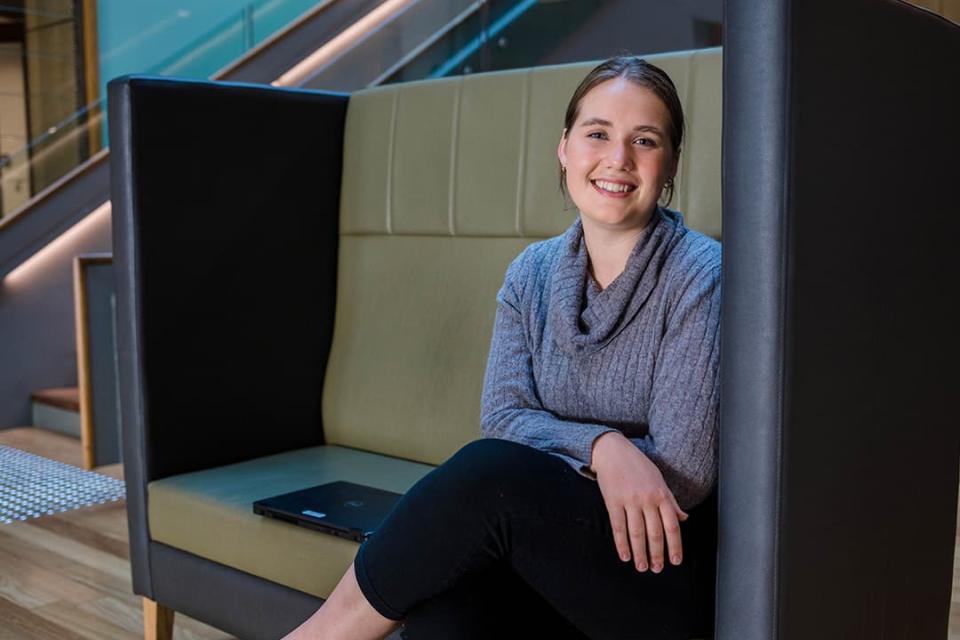
If you were employing the next arts, humanities and social sciences graduate, who would you be looking for?
Sebastian: I'd be looking for someone who is really on top of the subject that they're studying. They need to be topnotch students and coming from a topnotch university. At UQ, you would definitely get that kind of quality, so you're competitive at the top level, globally with others.
But I also want to see more than just that. I want to see someone who has been exposed to a study abroad scheme, which you get from UQ with around 20 partner universities. Lots of our students, by the time they graduate will have spent a semester or two at one of our partner universities. So, it's another exposure that shows that they are embracing the world, that they can navigate in sometimes difficult and challenging environments.
Having practical experience is also important – you can do internships as part of your degree. You might have to learn that additional language. To grapple with really challenging subject areas, to read, to craft, to write, to collaborate with others in teams, but also to work by yourself.
What have you learnt about yourself since you began your studies?
Giaan: I'd probably start with my limits. I've been able to set boundaries and know how to construct my life in university which is such an important thing to start in first year. You need to start organising yourself from day one really.
I've learned that anything you study, you can tailor to your own interests, which is so fascinating for me, because I like to find new approaches to look at things and you're taught that but you're also kind of forced to find it yourself as well, which is all part of how you're going to act in the workplace.
If you could give me one piece of advice that would set me apart as a job candidate, what would that be?
Sebastian: Follow your passion. At high school, you have to take subjects, you have a bit of choice, but you know you're forced to take them. You've decided, and chosen to go to university and to study what is in your interest. Why would you choose anything that doesn't drive your inherent interests and passions?
Sometimes you might have doubts about 'if I study that kind of subject will I be able to get a proper job in that field?’ The answer is top students in these areas, all get jobs in these fields. You're going to be inherently better as a student if you study something that you really feel passionate about, so go with that.
And then once you go with that, throw everything that you have at it. It's such an amazing opportunity to study at such an amazing university that opens these doors. So it's a matter of you choosing what you're passionate about, and then basically driving through that door that's opening for you.
Explore the Bachelor of Arts or discover what it's really like to study other programs at UQ.

